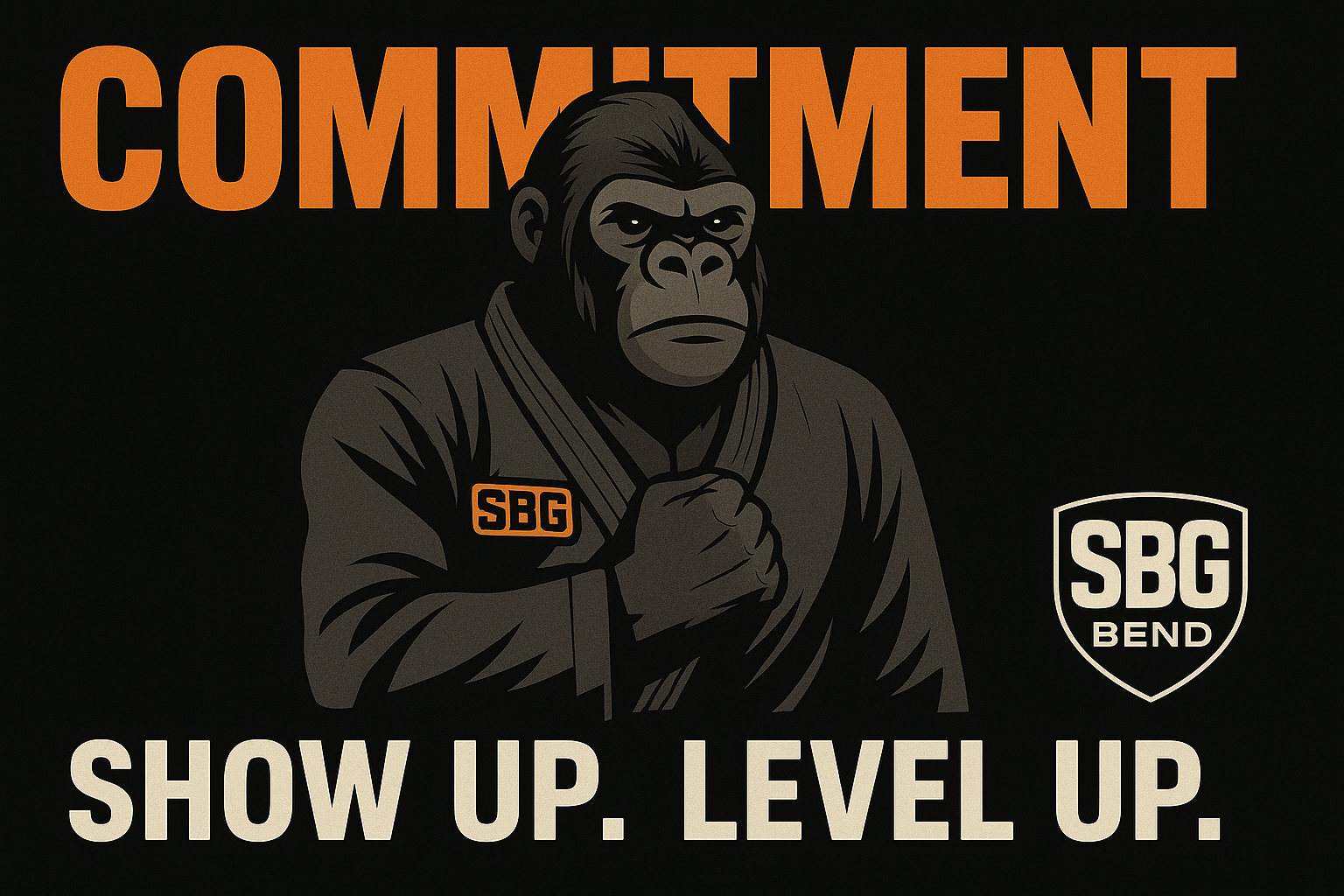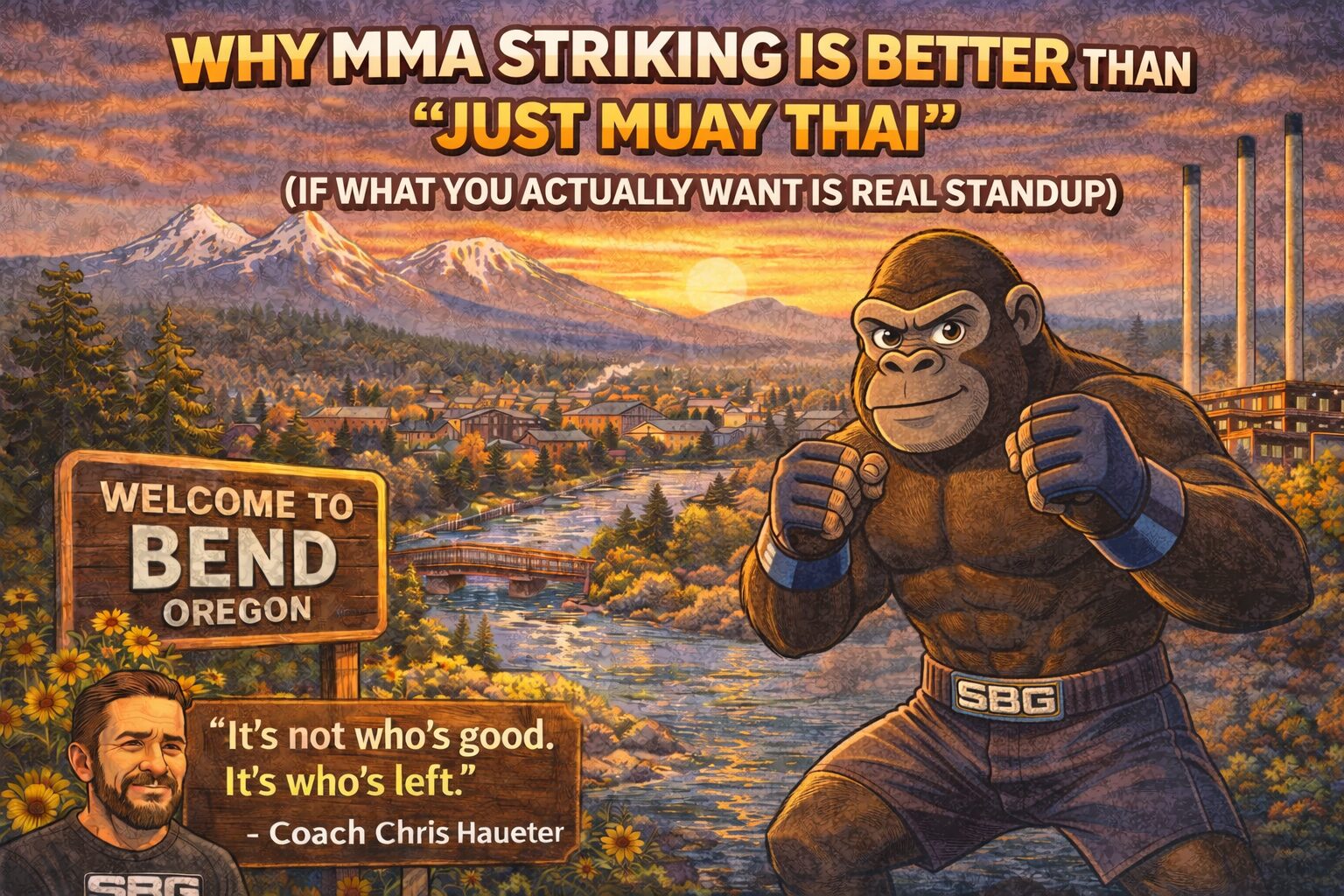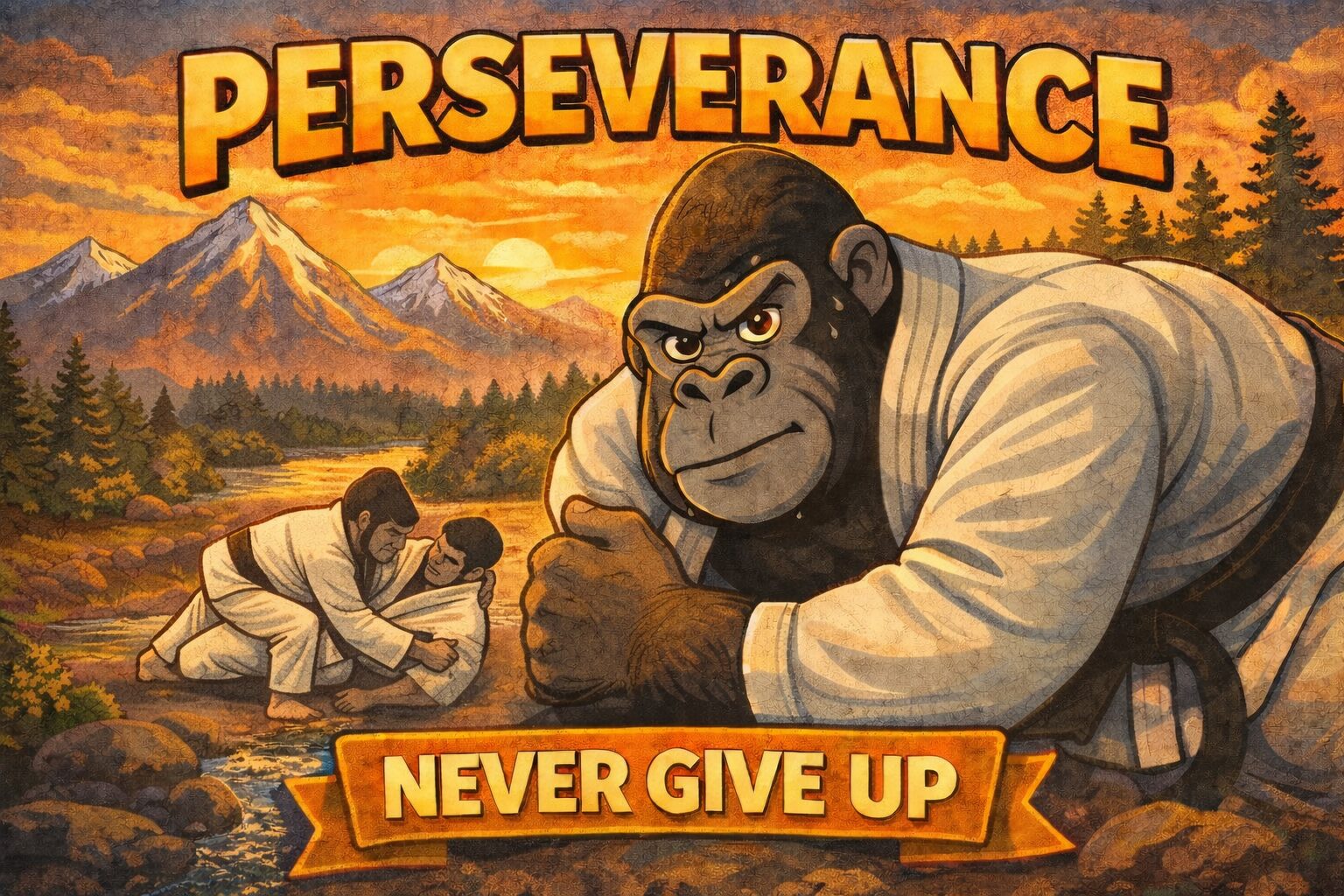
No Quit: Why Commitment is the Ultimate Martial Arts Skill (On and Off the Mat)
Everyone wants the results – the self-defense skills, the weight loss, the confidence, the bully-proofing for their kids, the discipline and leadership. But here’s the hard truth: none of those goals happen overnight. At SBG Bend, we’ll tell you straight-up that there’s no magic pill in martial arts (or life). The “secret” is something far less glamorous and far more powerful – commitment. In our gym culture, commitment means showing up consistently, especially when it’s tough. It’s a no-nonsense habit that underpins every success story on our mats and beyond.
Commitment isn’t just about doing martial arts; it’s about becoming tougher, smarter, and more resilient through martial arts. Below, we break down why sticking with your training is the critical skill for achieving any goal, how quitting early trains all the wrong habits, and what truly gets forged when you refuse to give up. This is a coach’s honest take – delivered with SBG’s tough love – on why showing up matters more than talent, and why the lessons of long-term consistency will spill into every part of your life.
Goals Take Time – There’s No “Four-Week Black Belt”
In an age of quick fixes, it’s easy to hope that a few weeks of classes will turn you into a fighter or that a month of training will shed 20 pounds. Reality check: meaningful goals like self-defense proficiency, lasting weight loss, real confidence or discipline require time and long-term consistency. SBG Ireland coach John Kavanagh put it bluntly after a championship fight: “You can’t learn a new skill in four weeks. New skills take four months – or a year.”[1] Mastery simply doesn’t come in a rush. Whether you’re aiming to confidently defend yourself or help your child become bully-proof, you have to invest weeks, months, and yes, years. The good news? That investment pays you back for a lifetime.
Think about it: a child doesn’t develop true discipline in a week of classes; they build it by showing up year-round, absorbing the structure and values on the mat. An adult doesn’t get in fighting shape from a few intense workouts; they do it through consistent training, week after week, until fitness is a habit.
All the big wins – a blue belt, 50 pounds lost, a shy kid turned confident leader – are just the visible tip of an iceberg built from countless small, regular efforts. The SBG tribe has seen this over and over. Our most inspiring success stories, from everyday students to UFC champions, all testify to one thing: consistency is king. In fact, SBG’s top coaches worldwide all hammer this same point – fundamentals and consistent training, supported by a good team, are the keys to success.[2]
So if you or your child have big goals, embrace the long haul. We’re not interested in quick-fix gimmicks at SBG Bend. We’re interested in who you can become over years of steady work. Patience isn’t passive – it’s an active form of strength. Every class attended, every drill repeated, every tough day overcome is a brick in the foundation of your goal. Commitment means understanding that progress is supposed to be a grind at times. And that’s okay – because you’re building something that lasts.
Quitting When It’s Hard Trains the Wrong Habit
Let’s address the elephant on the mat: at some point, training gets hard. You (or your child) will get tired, frustrated, maybe even temporarily bored or discouraged. That moment – when things are tough – is exactly when commitment matters most. If the response is to throw up your hands and quit, you’re training a habit of giving up. And habits, good or bad, will carry over into everything else.
This is especially crucial for parents to understand with kids. If a child is allowed to quit every time something is challenging – whether it’s jiu jitsu class, homework, or chores – they learn that “hard = stop.” That’s a dangerous lesson. Life will throw plenty of challenges at them. Do you really want to ingrain the idea that they should quit whenever they’re uncomfortable?
On the flip side, if you teach them to push through difficulty, you instill resilience and grit. Next time your son says he wants to quit BJJ because sparring got tough, or your daughter feels like giving up because she’s not winning yet – that is the golden opportunity to teach perseverance. Encourage them to stick it out a little longer, to try again tomorrow. When they do, they’ll experience the pride of overcoming an obstacle, and that feeling will become part of who they are.
Make no mistake, we apply the same standard to ourselves as adults. Everyone has days they don’t feel like coming to class or weeks where progress seems to stall. Champions and black belts are simply those who didn’t quit during those times. As the old saying goes, “A black belt is just a white belt who never quit.” It’s cliché because it’s true.
Quitting when it’s hard might give relief in the moment, but it creates a pattern that haunts you. Skip one workout because you “don’t feel like it,” and it becomes easier to skip the next. Before you know it, a promising student disappears for six months. We see it often: a teenager starts gaining confidence and skill, then gets distracted (a new video game, a new boyfriend/girlfriend, etc.) and suddenly training “doesn’t fit in.” The routine breaks, and all that progress evaporates. Head Coach Travis Davison has watched this happen and calls it the #1 training killer – losing focus and breaking your routine just when you were starting to grow.[3]
The lesson is simple: don’t let a temporary discomfort dictate your path. A tough week is not a reason to throw away months of work. A bad roll or a harder class than usual isn’t a sign that “this isn’t for you” – it’s a sign to dig in and come back again. In fact, when people ask Coach Travis how he manages to juggle family challenges and still train consistently, his answer is telling: “The real question is, ‘How do you not do it?’”[4]
In other words, if something is important to you, quitting simply isn’t on the table. That mindset is what we strive to instill in every student: when adversity hits, we don’t find excuses to quit – we find reasons to keep going.
The Lessons Commitment Teaches: Grit, Delayed Gratification, Mental Toughness
So what do you actually gain by toughing it out? Why not take the easy road? Because commitment itself is a master teacher. By not quitting, you’re internalizing life lessons that far outweigh any medal or belt color. Here are a few of the skills forged on the path of long-term training:
-
Resilience in the Face of Setbacks: When you train consistently, you inevitably face failures – tapping out to the same choke 20 times, losing a match, stalling on a weight plateau. Instead of breaking you, these setbacks start to build you. Each time you come back after “losing,” you’ve learned that failure isn’t final – it’s feedback. SBG’s motto, as John Kavanagh famously says, is “Win or Learn.” You either succeed or you learn from the attempt – both outcomes move you forward. SBG Coach Paul Sharp, who’s both a black belt and a former law enforcement officer, has seen how adversity forges character. “The people I trust the most are people that have at some point lost everything or almost everything… They appreciate life’s tempering process… Going through something isn’t an indictment of our character; how we emerge at the end… says a lot about our character.”[5]
-
Delayed Gratification & Patience: In martial arts, rewards come slowly. A new student might spend months just to feel somewhat competent, and years to earn a black belt. Kids learn that you don’t get a shiny trophy or a new belt just for showing up – you earn it through consistent effort and improvement. This is huge in a world of instant gratification. Commitment teaches you to trade the immediate comfort (“I’d rather watch TV now”) for long-term payoff (“I’ll be happier and healthier if I train tonight”). Psychologists say that the ability to delay gratification is a predictor of success in life. Well, consider the mats a laboratory for that skill. If a child can forego some lazy evenings to practice their jiu jitsu technique, they’re more likely to forego procrastinating on homework or give up other short-term temptations down the line. If an adult can stick to a training regimen for a year, they’ve proven they can commit to tough projects at work or save money instead of impulse buying. Martial arts rewards the patient. As Coach John Kavanagh pointed out, new skills take months of consistent practice[1] – but when those skills finally click, the confidence you gain is far sweeter than any quick win.
-
Mental Toughness & Navigating Discomfort: Let’s be real – rolling with someone trying to choke or armbar you is uncomfortable. So is getting up for 6 am class, or pushing through the last round when you’re exhausted. But guess what? You get comfortable being uncomfortable. You learn that discomfort is not an emergency; it’s just a step toward growth. Over time, challenges that used to rattle you become no big deal. Public speaking, tough conversations, high-pressure situations – they start to feel easier because you’ve trained your mind to handle stress on the mat. We often tell students, “If you can stay calm while mounted by a 200-pound person, you can stay calm during that presentation at work.” It’s true. Commitment to training builds a mental callus. You don’t shy away from hard things because you’ve proven to yourself you can do hard things. Even more, you learn to let go of ego and embrace learning. When you stay the course, you realize it’s not about being the best in the room every day – it’s about getting better. You tap, you learn, you improve. That humility and mental fortitude is rare and powerful. As Coach Matt Thornton says, “Embrace the struggle – the results will follow.”[6] Commitment teaches you to love the process of grinding and growing, not just the outcome.
-
Intrinsic Motivation: An often overlooked lesson of commitment is learning to motivate yourself from within. In the long journey of martial arts, external validation (like praise from coaches or quick wins) can be fickle. The students who stick around learn to find joy and purpose in the practice itself, not just the pats on the back. SBG’s first female black belt, Coach Lily Pagle, is a great example. She earned her BJJ black belt at age 51 and even a Master’s degree at 48[7], all by focusing on enjoying the journey. As Coach Lily says, if you chase constant praise, “sometimes you get disappointed, you don’t feel like doing [it] or feel like giving up,” so she focuses on “intrinsic motivation” – making training fun and fulfilling for herself[7].
That mindset is what keeps you training after the initial novelty wears off. You stop needing a gold star for every class; the work becomes its own reward. When a child realizes they actually love the act of training – the sweat, the camaraderie, the tiny improvements – they no longer need a trophy to keep going. When an adult falls in love with the art, they’ll train for life because it feeds them mentally and physically. Commitment breeds intrinsic drive, which in turn fuels further commitment in a virtuous cycle.
In short, sticking with martial arts changes you at a deep level. It’s not just about accumulating techniques – it’s about becoming a grittier, more patient, tougher, and internally-driven person. Those qualities will echo in everything you do. We like to say we’re not just training fighters – we’re training human beings to handle whatever life throws at them.
The Gym Is a Training Ground for Life Skills
Why is a place like SBG Bend so focused on commitment and personal development? Because the martial arts gym is a laboratory for life. It’s where you practice and pressure-test the traits that make people successful in any arena. Our mats are filled with people of all ages and backgrounds, each struggling, learning, failing, and succeeding in real time. That environment, when guided by good coaches, forges life skills in a unique way.
Take our kids’ program, for example – the Growing Gorillas. It’s not just playtime in pajamas. It’s a carefully designed system pairing child-development science with SBG’s training ethos to build confident, resilient kids at every stage.[8] Yes, they learn grappling and self-defense, but they’re also learning how to set goals, deal with frustration, respect others, and persevere. Every month we emphasize a “life skill” (like focus, teamwork, or perseverance) alongside the physical skills.
The gym becomes a safe place to experience struggle and growth. A 7-year-old might start out shy and afraid of failing. A year later, after regularly facing challenges on the mat, that same child often stands taller, speaks up, and isn’t paralyzed when something doesn’t go their way. That didn’t happen by accident – it happened because the habit of showing up and pushing through difficulty at the gym rewired their mindset.
The same goes for our teens and adults. A martial arts academy is one of the few places left where people willingly subject themselves to voluntary hardship in a supportive community. Why do we do it? Because it makes everything else in life easier by comparison. You’re training your nervous system and your spirit to handle pressure. Job interview? Big exam? Difficult project? After you’ve been through countless tough sparring sessions where quitting wasn’t an option, you approach life’s challenges with a calmer, more confident disposition. You know you can grind through discomfort because you’ve literally done it every week in training.
Another huge factor is the tribe, the community. When you commit to a gym like SBG Bend, you’re not just getting a facility – you’re joining a tribe of people who share your values of growth and persistence. That tribe lifts you up on days you’re dragging and holds you accountable when you might slack off. Coach Leah Taylor – SBG Montana’s first female black belt – has noted how vital this camaraderie is, especially for those who might feel isolated. She observed that women who have a supportive women’s class “will train jiu jitsu longer” and are “far more likely to make it through that first year.”[9] This applies to everyone: surround yourself with people who don’t quit, and you won’t quit either.
At SBG Bend we foster a “One Tribe, One Vibe” culture – egos are checked at the door, everyone helps everyone. That means when you’re struggling, you have coaches and teammates giving you pointers, cheering you on, and sometimes just commiserating that “yeah, that was a tough roll, but we’ll get it next time.” It’s a built-in support system for your commitment. Over time, you internalize that support and it becomes self-support. You learn to trust the process and trust yourself.
All of this is why we say our gym trains life leaders, not just fighters. We’ve had parents tell us that after a year in BJJ, their child’s grades improved and their tantrums at home dropped – not because we tutored them in math or scolded them about attitude, but because the dedication learned on the mat bled into their school and home life. Adult students often report similar effects – they find themselves more disciplined at work, more patient with family, more resilient in the face of setbacks. The mat is like a mirror that shows you your character under stress, and a forge that lets you refine it. And through commitment, you steadily reshape that character for the better.
Showing Up Beats Talent – Every Time
One of the most important lessons you’ll learn at a place like SBG is this: effort trumps talent when talent doesn’t work hard. We see it time and again. A newcomer might appear to have natural athleticism or quick learning ability – they shine for a few weeks. Meanwhile another student struggles with basic movements. But fast forward a year: if the “talented” one trained sporadically and the other student showed up diligently, odds are the hard-worker has far surpassed the naturally gifted one.
Consistency is the great equalizer. The mats don’t lie about who has put in the time.
Martial arts history is full of examples. Forrest Griffin, UFC legend and SBG alumnus, started out as “just another guy walking into a gym, not some prodigy.”[10] He simply worked, day in and day out, under great coaches and with great commitment. Eventually, he outpaced more “gifted” training partners and became a world champion.
Closer to home, we’ve had many students who initially struggled – maybe they weren’t in shape or weren’t coordinated – but they kept training consistently and achieved in a couple of years what none of their day-one attributes would have predicted. On the flip side, we’ve seen athletic youngsters who assumed it would always be easy; when they hit the first plateau or got challenged by an equally athletic peer, they lost interest. Talent might give you a head start, but commitment determines the finish line.
Coach Matt Thornton drives this point home with a simple rule for training: “Unless you’re injured, sick, or resting for competition – never skip a workout.”[6] He often contrasts two types of athletes: one who has a basic routine but never misses training, and another who chases the perfect program but trains inconsistently. After one year, who’s ahead? “An athlete who has a simple, basic exercise routine… but never skips a workout, will… be a lot more fit than the wannabe… who sticks with [an intense program] for a month.”[6]
The message is crystal clear: showing up regularly beats occasional flashes of brilliance. You build momentum each time you come in and lay another brick. If you keep laying bricks, you build a castle. If you lay a few, then stop, then start over, you end up with a bunch of scattered bricks and no walls.
Put another way, the mat rewards those who keep coming back. We don’t care if you were the most awkward, out-of-shape beginner in your first class – if you keep coming to class, you’re already ahead of the athlete who came twice and disappeared. In six months, you’ll see noticeable improvement. In a year, you won’t recognize your old self. In five years, you might be the one helping the new “naturally talented” guy learn your moves. And when people comment on how skilled or fit or confident you are, you’ll know the truth: it wasn’t talent – it was commitment.
Remember Coach Lily Pagle, who earned her black belt at 51? It wasn’t because she started off as an unbeatable super-athlete. It was because she never stopped training and learning. “Old” was just a word – she showed up and put in the work while others would have made excuses. That’s why she’s an SBG Black Belt and an inspiration to an entire tribe.[7]
The same can be said for many of our coaches and seniors – they’ll be the first to admit they didn’t get where they are by sheer talent. They got there by refusing to quit.
Showing up is a skill – maybe the foundational skill – and it’s one anyone can learn. It doesn’t require innate ability, just the willingness to prioritize your goals and stick to your plan. And it’s incredibly empowering once you realize this. You don’t have to compare yourself to anyone else’s natural gifts. Your superpower can be outworking and outlasting the obstacles. Consistency beats intensity. Habit beats talent when talent falls in love with its reflection. So, decide that you will be the one who remains when others fall away. In the long run, that is what produces champions on the mat and high-achievers off the mat.
Conclusion: Embrace the Grind, Reap the Rewards
At SBG Bend, you’ll hear phrases like “One Tribe, One Vibe” and “Win or Learn,” but perhaps the most important mantra could simply be: “Just keep showing up.” It sounds almost too simple, but behind that simplicity lies the entire spectrum of personal growth. By committing to the process – by coming to class on the days you’re excited and the days you’re exhausted – you are steadily transforming into the very person you set out to become when you first walked through our doors.
Every goal you told us about – from getting in shape, to learning to defend yourself, to helping your child build confidence – depends on your commitment.
The value of commitment is that it unlocks all the other values. It’s the master key. Discipline, skill, confidence, fitness, mental toughness – none of those can flourish without the soil of consistency and perseverance. The mats will test you; some days they’ll humble you. But if you trust the process and return, those same mats will eventually reward you in ways you might not even anticipate. You’ll discover that you’ve built an unshakeable confidence, not because everything is easy, but because you’ve proven to yourself you can overcome the hard. You’ll find that your kids have developed a “can-do” attitude and grit that sets them apart from their peers. You’ll notice that challenges outside the gym don’t intimidate you like they used to. This is the quiet superpower that commitment gives you.
The tone at SBG is often direct and no-excuses, and here it is: Martial arts is not a short-term fix or a casual hobby if you want real results – it’s a lifestyle and a long-term journey. But it’s one of the most rewarding journeys you or your child will ever undertake. Our coaches and tribe will be there with you every step, but you have to take those steps. The formula is simple, even if the execution isn’t always easy: show up, keep going, and don’t quit. As Coach Matt Thornton emphasizes, humans are creatures of habit – “Get out of routine, you lose the habit; maintain the routine, and you create the habit.”[6]
So build the habit that builds the better you. In the end, commitment is a choice – a hard one, yes, but a profoundly empowering one. It’s saying “yes” to your goals not just once, but over and over, especially when it’s inconvenient. It’s having the toughness to stay the course and the faith that, with time, your effort will pay off. And it will – we’ve seen it countless times.
So next time you’re tempted to skip class or your child says “I don’t want to go today,” take a breath and remember why you started. Remember that every time you don’t quit, you’re training the muscle of success. The mat will welcome you back, and you’ll be one step closer to your best self.
Commitment is the critical skill we build at SBG Bend – and if you embrace it, you’ll achieve far more than you ever thought possible, on the mats and in life. Now suit up, step through the doors, and let’s keep building that habit. No quit. The results are coming, and they’re worth every ounce of effort.
坚持 (Finish strong – because you can.)
Sources
- nathanhook.org – “John Kavanagh on Learning New Skills”
- sbgbend.com – “From Beginner to Champion”
- sbgmontana.com – “Pursuing Your Passion”
- straightblastgym.com – The Gorilla Press #86
- straightblastgym.com – The Gorilla Press #85
- mattthornton.org – “Fighting – and, not or – Fitness”
- medium.com – “Intrinsic Motivation”
- sbgbend.com – “SBG Bend Articles”
- coachleahbjj.wordpress.com – “In Defense of Women’s Only Jiu Jitsu Classes”
- sbgbend.com – “From Beginner to Champion” (Forrest Griffin feature)





